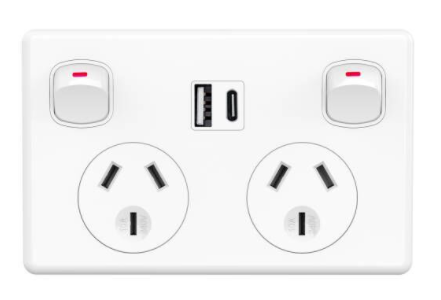USB ports are used by people to power and charge a wide variety of objects, like e-readers, smartphones, and tablets. This can cause issues when attempting to charge several devices at once. Thankfully, USB outlets have started to become more mainstream in recent times. You might be wondering to yourself, are they worth installing in your home or office?
Let’s go through what a USB outlet is, the advantages of having them installed in your home or office, and if they are worth it in general.
What Is a USB Outlet?
USB outlets are an alternative to traditional wall outlets, and they feature USB sockets, along with the two electrical outlets. These are traditionally installed by licensed electricians, and you can use them to charge or power electrical devices like phones and other gadgets. As long as the device uses a USB cable to charge/power it, it will be able to connect directly to the USB wall outlet.
The energy that comes through a USB port is the same as what comes through the electrical outlet unless otherwise specified, and they are very safe to use as long as manufacturer-approved cords and USB cables are used. You should not see any difference in your electricity bill from using USB outlets compared to using adapters with standard electrical outlets.
5 Advantages of Installing USB Outlets in Your Home
Charging your USB devices can sometimes be a hassle if you can’t find the right adapter or all the electrical outlets are full. Thankfully, with the introduction of these new outlets, users have the option of plugging their devices directly into the wall without the need for an adapter. Let’s look at the five main advantages of installing USB ports in your home.
Faster Device Charging
All devices charge faster when connected directly to USB wall outlets than through an adapter. If you are using devices that have large batteries, this can make a significant difference to the amount of time they take to charge.
Convenient Use
Most household items like computers, lamps, televisions, and others all require an electrical outlet. USB wall outlets allow these items to remain plugged in, while some smaller devices like smartphones or others can also charge via a USB port. It also reduces the space needed as fewer adapters are being used. USB ports generally support all speakers, phones, and other kitchen devices.
Decreases Number of Adapters
As mentioned previously, the use of USB ports on the outlets significantly reduces the number of adapters that need to be used. This saves space on the outlet and allows you to leave the adapters where they are needed instead of moving them around.
More Versatile
USB ports can serve many functions and can be used on their own or as a part of a larger smart home system. They are also relatively strong and are more robust than most mobile USB ports. This makes them perfect for installation anywhere in a house, including bedrooms and the kitchen, where people are most likely to be charging their devices.
Less Electricity Used
USB outlets use less electricity when they’re on standby. Thresholds have been imposed in Europe that have to be met, and designers took this challenge and created USB outlets that use 20% of the European legislation of 0.09 Watt. This energy efficiency is echoed around the world, even in Australia.
Is a USB Electrical Outlet Worth It?
When USB technology was created in 1996, it was made to connect computer peripherals more conveniently. Since then, USB ports have become the standard and replaced serial and parallel connectors almost entirely. USB ports have remained the same over the years and will be around for years to come.
This makes the installation of USB outlets worthwhile, as you can charge a device from 1996 much the same way as you can charge a brand-new device. USB outlets offer wide compatibility and versatility for plugging in devices. There can be significant savings from using less electricity by installing USB outlets.
USB outlets can come in many different configurations; some integrate one or two USB ports with traditional electrical power outlets. Others offer different types of USB outlets, like USB-A, higher-powered 2.4A, and USB type C. Some other reasons that installing USB outlets could be worth it are:
- Charge multiple devices at once from one outlet without an adapter (up to four in most cases)
- They are inexpensive to install and can raise a home’s overall value
- USB outlets can replace standard electrical outlets, in a matching wall plate
- Full-power USB provides the same amount of power to each port
- Depending on the specific outlet, micro-USB charging can be available for smartphones
USB outlets are a modern option that can also make your home more attractive to prospective buyers, along with providing great convenience for your day-to-day life. Once you have decided that you would like to install USB outlets, you must then choose the right type for you. Most USB outlets look similar, but they can differ in ease of installation, safety, and power capacity. If you have pets or children, incorporating tamper resistance might be worthwhile.
Summary
USB outlets are similar to most electrical devices; you get what you pay for. This means that you do not want to skimp on the quality of the USB outlet that you install, should you choose to go down that route. It is also important to consider how many outlets you want to install, as outlets down low in a hallway (for example) might not need USB ports. Selecting certain outlets to upgrade instead of overhauling every outlet can help save costs.
USB outlets can be a worthwhile upgrade if you have multiple devices requiring USB charging. If you require an electrical repair or wish to have some USB outlets installed, Glenco can help! Request a callback today on our website.







